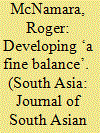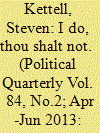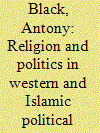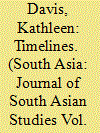|
|
|
Sort Order |
|
|
|
Items / Page
|
|
|
|
|
|
|
| Srl | Item |
| 1 |
ID:
153013


|
|
|
|
|
| Summary/Abstract |
This paper intervenes in the debate over whether secularism can protect religious minorities in India or whether alternative models are needed. I explore this issue by examining Rohinton Mistry's novel Family Matters, which focuses on religious extremism within the minority Parsi community. The novel suggests that the individual needs to maintain ‘a fine balance’ between religious beliefs and personal rights. It recognises that secularisation has shaped modern religious identity and, consequently, facilitated religious extremism. By de-coupling religion from secularisation, Mistry demonstrates that religion need not be rigid and can adapt to different social circumstances, while continuing to provide moral strength.
|
|
|
|
|
|
|
|
|
|
|
|
|
|
|
|
| 2 |
ID:
122486


|
|
|
|
|
| Publication |
2013.
|
| Summary/Abstract |
Proposals to legalise same-sex marriage have provoked one of the most high-profile and controversial political debates in recent years. The plans, being introduced by the governments at Westminster and Holyrood, have divided political and public opinion and have attracted widespread opposition from religious groups. However, while religious attitudes to homosexuality are shaped by theological concerns, religious justifications have been largely absent from the case against same-sex marriage. Instead, religious groups have presented their arguments in secular terms centred on tradition, social utility, democratic values and the threat to religious rights and freedoms. This particular framing of the issue reflects processes of secularisation, a growing use of identity politics and the composition of religious groups themselves.
|
|
|
|
|
|
|
|
|
|
|
|
|
|
|
|
| 3 |
ID:
111487


|
|
|
|
|
| Publication |
2012.
|
| Summary/Abstract |
Building on recent literature, this article discusses four ways of studying the relationship between religion and nationalism. The first is to treat religion and nationalism, along with ethnicity and race, as analogous phenomena. The second is to specify ways in which religion helps explain things about nationalism - its origin, its power or its distinctive character in particular cases. The third is to treat religion as part of nationalism, and to specify modes of interpenetration and intertwining. The fourth is to posit a distinctively religious form of nationalism. The article concludes by reconsidering the much-criticised understanding of nationalism as a distinctively secular phenomenon.
|
|
|
|
|
|
|
|
|
|
|
|
|
|
|
|
| 4 |
ID:
095300


|
|
|
|
|
| Publication |
2010.
|
| Summary/Abstract |
Early Christianity viewed religion and politics as largely separate; early Islam viewed them as largely concurrent. But from the eighth to the eleventh centuries each modified their original position, so that they almost converged. However, they subsequently diverged again. This was because, in the West, political thought became secularised following the eleventh-century papal reform movement and then the Protestant Reformation. Muslim thinkers, on the other hand, beginning with al-Mawardi (974-1058), sought to restore the subsumption of politics into religion, notably during the sixteenth-century Shi'ite revolution in Iran. While today the West views religion and politics as largely separate categories, Muslims see them as necessarily intertwined; attempts to separate them have so far largely failed. Hence Muslim political thought is based primarily on revelation (interpreted in various ways), while Western political thought is based on philosophy.
|
|
|
|
|
|
|
|
|
|
|
|
|
|
|
|
| 5 |
ID:
174033


|
|
|
|
|
| Summary/Abstract |
This article explores the construction of discursive actions and positioning of adult Israeli Jews who are renouncing their affiliation with religious Judaism and are seeking help in a secular computer-mediated ‘troubles forum’. Adopting the perspective of data-oriented discourse analysis and using content and figurative language analyses, the article shows that all participants, men and women, are performing a forbidden discursive action from the perspective of the religious world when they voice their emotions, thinking about and coping with the complex process of secularisation. It also shows that the participants frequently oscillate between the religious and secular worlds even when they have joined the secular society.
|
|
|
|
|
|
|
|
|
|
|
|
|
|
|
|
| 6 |
ID:
137262


|
|
|
|
|
| Summary/Abstract |
This essay advances an argument regarding the structure of periodisation and the ways in which it limits critique of imperial historiography. It focuses first on the history and structure of medieval/modern periodisation and its relationship to the more recently popular ‘early modern’, and then turns briefly to the historiography of feudalism, an important anchor of the period concept, ‘the Middle Ages’. It then attends in more detail to the historiography of secularisation, particularly the recent tendency to find a secularising impulse in the texts of ‘early modern’ authors such as Vitoria and Grotius, which ultimately reinscribes the imperial logic that Subaltern Studies has worked to critique.
|
|
|
|
|
|
|
|
|
|
|
|
|
|
|
|
|
|
|
|
|